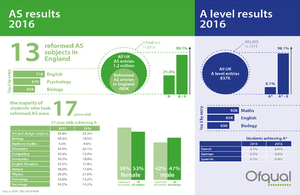A guide to AS and A level results, summer 2016
A summary of AS and A level results in 2016

An infographic summarising 2016 summer AS and A level results
Key points
-
Overall results this summer for AS and A level are very stable, with only small changes in the proportions achieving each grade. These small changes are a result of normal variation.
-
There are 13 new AS qualifications awarded for the first time in England this summer. Results from these qualifications do not count towards the final A level grade and so we have seen a drop in entries in these new subjects.
-
AS overall results are up just over 1% at A, but the results include unreformed AS and reformed decoupled AS in England and therefore we cannot make meaningful comparisons between 2015 and 2016. Overall entries for AS are down by 14%, largely as a result of the introduction of reformed AS in England.
Summary
Across all UK students, the proportions achieving grades in summer 2016 are as follows:
A level
-
The proportion achieving A* is down 0.1 percentage points from 8.2% in 2015, to 8.1% this year.
-
The proportion achieving A* and A is down 0.1 percentage points from 25.9% in 2015 to 25.8% this year.
-
The proportion achieving A* to E is unchanged at 98.1%.
We have published separately our analysis of school/college level variation in year-on-year results in a number of high-volume subjects.
AS
- Overall entries for AS are down by 14%, largely as a result of the introduction of reformed AS.
The data indicate that 17% of schools in England who had previously offered AS qualifications in reformed AS subjects did not offer any AS qualifications in those subjects in 2016. Of the others, 44% reduced the number of AS qualifications they previously offered in reformed subjects, and the rest (39%) maintained the number of AS qualifications they previously offered in reformed subjects.
-
Overall AS data published by JCQ contain a mix of unreformed and reformed AS and therefore comparisons between 2015 and 2016 are less meaningful.
-
Outcomes for reformed AS subjects are similar to those achieved by 17 year olds in 2015.
The overall data include some students re-taking the old version of the AS, in most cases at the same time as taking the A level in that subject. A more meaningful comparison can be made between students in England studying reformed AS subjects and the results achieved by the equivalent age group in 2015. On this basis, the proportions of students achieving a grade A in 2016 and 2015 are very similar in aggregate. Where there are differences, they are likely to be a reflection of differences in the prior attainment of the cohort.
Percentage of 17 year-old candidates achieving A-U who achieved an A:
| 2015 | 2016 | |
| A | A | |
| Art & Design subjects | 21.8% | 22.3% |
| Biology | 18.5% | 18.5% |
| Business Studies | 9.4% | 9.6% |
| Chemistry | 19.9% | 20.1% |
| Computing | 10.6% | 13.0% |
| Economics | 19.7% | 18.8% |
| English literature | 17.7% | 17.8% |
| History | 18.0% | 17.6% |
| Physics | 20.9% | 21.6% |
| Psychology | 13.0% | 13.2% |
| Sociology | 14.2% | 14.2% |
We have published separately our analysis of school/college level variation in year-on-year results in the 13 new AS subjects
Modern foreign languages (MFL): French, German and Spanish
In recent years, teachers and other stakeholders have raised concerns about how few students achieve the top grades in the MFL A levels, compared to other A level subjects, and whether the right students were being awarded these top grades.
In response to these concerns, we conducted an in-depth analysis of the design and working of the exam questions in A level French, German and Spanish. We also published a report recently which details our work to date .
This year, the proportion of students achieving A* in French, German and Spanish has increased.
Our approach to AS and A levels in summer 2016
Our approach to summer 2016 AS and A levels has been to use predictions based on students’ prior attainment at GCSE, as was the approach in previous years. We agreed with exam boards that if the students in summer 2016 entering for a particular A level subject are similar, in terms of their GCSE attainment, to the students in 2015, then we would expect results to be similar. This approach aims to make sure that the standards between different exam boards in a subject are aligned.
We used the same approach for the new AS qualifications being awarded for the first time this summer in order to avoid unfairly disadvantaging those students who are the first to sit these new qualifications.
We have also today published an infographic.
Notes to editors
This report is based on data published by JCQ
New AS qualifications are art & design, biology, business, chemistry, computing, English language, English language & literature, English literature, history, physics, psychology, sociology.
Art & Design subjects include all art and design endorsements.